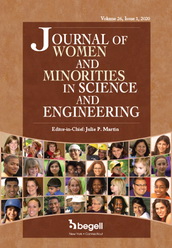
Publicado 6 números por año
ISSN Imprimir: 1072-8325
ISSN En Línea: 1940-431X
Indexed in
UNDERGRADUATE INSTITUTIONS THAT FOSTER WOMEN AND MINORITY SCIENTISTS
 Get access
Get access
SINOPSIS
This article reports the results from two studies: one identifying universities that produced relatively large numbers of students of color who went on to earn doctorates in the sciences across one decade, and a second study identifying universities that produced relatively large numbers of women who earned science doctorates across a different decade. Institutions that were identified in both studies can be described as providing unique environments that fostered under-represented scientists.
-
Hubbard Steven M., Stage Frances K., Identifying comprehensive public institutions that develop minority scientists, New Directions for Institutional Research, 2010, 148, 2010. Crossref
-
Stage Frances K., John Ginelle, Hubbard Steven M., Chapter 1 Undergraduate Institutions that Foster Black Scientists, in Beyond Stock Stories and Folktales: African Americans' Paths to STEM Fields, 2011. Crossref
-
Foschi Martha, Valenzuela Jerilee, Who is the better applicant? Effects from gender, academic record, and type of decision, Social Science Research, 41, 4, 2012. Crossref
-
John Ginelle, Stage Frances K., Minority-Serving Institutions and the Education of U.S. Underrepresented Students, New Directions for Institutional Research, 2013, 158, 2014. Crossref
-
Foschi Martha, Valenzuela Jerilee, Choosing between two semi-finalists: On academic performance gap, sex category, and decision question, Social Science Research, 54, 2015. Crossref
-
Hurtado Sylvia, White-Lewis Damani, Norris Keith, Advancing inclusive science and systemic change: the convergence of national aims and institutional goals in implementing and assessing biomedical science training, BMC Proceedings, 11, S12, 2017. Crossref
-
Benabentos Rocio, Ray Payal, Kumar Deepak, Shuster Michèle, Addressing Health Disparities in the Undergraduate Curriculum: An Approach to Develop a Knowledgeable Biomedical Workforce, CBE—Life Sciences Education, 13, 4, 2014. Crossref
-
Burrell Darrell Norman, An Exploration of the Cybersecurity Workforce Shortage, in Cyber Warfare and Terrorism, 2020. Crossref
-
Burrell Darrell Norman, An Exploration of the Cybersecurity Workforce Shortage, International Journal of Hyperconnectivity and the Internet of Things, 2, 1, 2018. Crossref
-
Murphrey Theresa Pesl, Carter Carmen R., Regisford E. Gloria C., Carson Laura E., Butler-Purry Karen, Carter-Sowell Adrienne R., Ganesan Asha, Richburg Audra, An Examination of the Paths of Successful Diverse STEM Faculty: Insight for Programming, Frontiers in Education, 7, 2022. Crossref